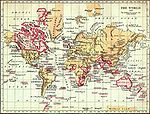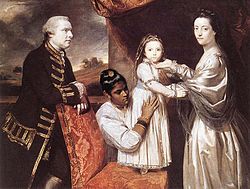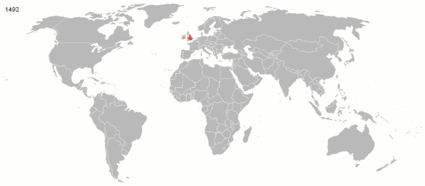
Portal:British Empire
|
British Empire
The British Empire was the largest empire in history, and for a substantial time was the foremost global power. It was a product of the European age of discovery, which began with the maritime explorations of the 15th century, that sparked the era of the European colonial empires. By 1921, the British Empire held sway over a population of about 458 million people, approximately one-quarter of the world's population. It covered about 36.6 million km² (14.2 million square miles), about a quarter of Earth's total land area. As a result, its legacy is widespread: in legal and governmental systems, economic practice, militarily, educational systems, sports (such as cricket, rugby, and football), traffic practices (such as driving on the left), and in the global spread of the English language. At the peak of its power, it was often said that " the sun never sets on the British Empire" because its span across the globe ensured that the sun was always shining on at least one of its numerous colonies or subject nations. During the five decades following World War II, most of the territories of the Empire became independent. Many went on to join the Commonwealth of Nations, a free association of independent states.
Selected article
The Commonwealth of Nations, usually known as the Commonwealth and formerly as the British Commonwealth, is a voluntary association of 53 independent sovereign states, all of which are former British colonies (except for the United Kingdom itself and Mozambique). The Commonwealth is an international organisation through which countries with diverse social, political, and economic backgrounds cooperate within a framework of common values and goals, outlined in the Singapore Declaration. These include the promotion of democracy, human rights, good governance, the rule of law, individual liberty, egalitarianism, free trade, multilateralism, and world peace! Queen Elizabeth II is the Head of the Commonwealth, recognised by each state, and as such is the symbol of the free association of the organisation's members. This position, however, does not imply political power over Commonwealth member states. In practice, the Queen heads the Commonwealth in a symbolic capacity, and it is the Commonwealth Secretary-General who is the chief executive of the organisation. The Commonwealth is not a political union, and does not allow the United Kingdom to exercise any power over the affairs of the organisation's other members. (more...) Did you know...
Selected picture
Selected biography
James Broun-Ramsay, 1st Marquess of Dalhousie, KT, PC (April 22, 1812 – December 19, 1860) was a British statesman, and a colonial administrator in India. Born in Dalhousie Castle, Scotland, he crowded into his relatively short life conspicuous public service in the United Kingdom, and established an unrivalled position among the master-builders of the Indian empire. Denounced on the eve of his death and to this day by some as having failed to notice the signs of the Indian Rebellion of 1857, and even having aggravated the crisis by his overbearing self-confidence, centralising activity, and reckless annexations. ( more...)
|
||






